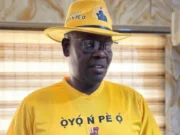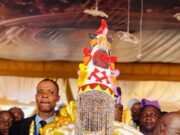By now, Governor Makinde ought to have realised that Oyo kingmakers are not pushovers.
He has called them out publicly but they stayed strong in souls and spirits. He has asked the anti-graft agency to hound and hunt them down yet they remain undaunted. He has refused to approve their ratification yet they remain unwavering. The kingmakers have matched Governor Makinde and his agents’ words for words, eye for eye, and actions for actions.
In fact, in some instances, they appeared ahead of the Governor, winning people’s sympathy and solidarity while standing firm in the choice of the new Alaafin. In different interventions, they’ve maintained the same dignifying poise and fortitude that is, in line with Oyo customs, traditions, and chieftaincy declaration, a new Alaafin has emerged. And that Prince Lukman Gbadegesin is the Alaafin elect. We learned from history that the Oyo Mesi is the privy council of Oyo and that their existence dates back to the medieval period when it served as the government of a powerful pre-colonial state that was known as the Oyo Empire. Quite evidently, no Alaafin as we have seen so far was capable of being enthroned without the prior consent of and performance ritual of the Oyo Mesi. They were a ruler’s (Alaafin) principal advisors and sacred officiants, and also served a variety of judicial and administrative functions in his realm. In other words, no Alaafin can emerge without the consenting authority of the Oyo Mesi. The government’s role is only to approve whatever is arrived at by the kingmakers.
Consequently, creating a powerful force that can check the excesses of the King has been described as utterly remarkable, an idea whose time preceded the evolution of constitutional democracy in the West. Like any other institution of historical and symbolic repute, the uncanny ability of the Oyo mesi to withstand all sorts of onslaught and destruction is a testament to its resilience and doggedness. In the 19th century, this organizational structure survived the fall of the old empire and now as Governor Makinde wages internecine war against the kingmakers, its popularity has only grown in leaps and bounds. Not a coincidence that the choice of the next Alaafin of Oyo has attracted and generated frenzied public attention both within and outside Oyo. The reasons are not far-fetched. The title of the Alaafin of Oyo still commands huge respect and reverence in and outside Yorubaland. But as this avoidable and needless power tussle between the Governor and the Kingmakers roars from the boardroom to the courtroom, it is crucial to look at some of the underlying issues tearing the two sides apart.
First off, this battle is political. Obviously, this is a sentiment that an average indigene of the ancient Oyo has toward the Governor and his stooges. Most believe the rancor is merely a manifestation of deep-seated political animosity. Others assumed that the race to the throne had only provided the ground for the powerful to flex their muscles and prove their mettle. Quite surprisingly, a tiny fraction of Oyo people contended that the fisticuff was simply an intra-party affair that should have been handed with deft and diplomacy. Within the Oyo metropolis, the face-off between the Governor and the Oyo Mesi is seen as an attempt by those in power to foist their choice on the throne regardless of what’s at stake. That was why the first court appearance of the Oyo Mesi in Awe received such huge moral support and solidarity from the people. Does the Governor have an axe to grind with the Oyo Mesi as far as the next occupant of the throne is concerned? Definitely.
Naturally, a sitting Governor has no business with the selection of say, the Alaafin of Oyo. The declaration is crystal clear. Now, lots of people are milling behind Oyo mesi to protect the sacredness of the throne while rooting for the kingmakers to fight their adversaries with every drop of their blood.
What is wrong with the Oyo Mesi selection? Well, the answer to this question depends on which side of the divides you stand. For the average Oyo man, there’s absolutely nothing wrong with the selection. No doubt about Prince Gbadegesin’s royal blood. He is a descendant of the 7th Alaafin Muhammed Bello Gbadegesin. His father, Aremo Sanni Gbadegesin was a widely loved Oyo Prince whose death attracted towns and gowns, from far and near. Till today, nobody has come out to dispute the qualification of Prince Lukman Gbadegesin to the venerated throne of the Alaafin. None. This also raises the question of the neutrality of the Governor. In essence, the inability of the Oyo mesi to dance to the tunes of the Governor is said to have prepared the ground for this current clash. In a way, Governor Makinde’s kind of neutrality is one where his choice will prevail. What is neutrality when it doesn’t favor the governor? Neither Oyo Mesi nor Prince Gbadegesin is being persecuted because of any royal malfeasance, they are simply being dragged for reasons I will highlight shortly.
Religion. The question being asked is this: what if the selected candidate is the preferred of the Governor and his honchos? Nearly all the Kingmakers, from Bashorun, Agbaakin, Samu, Alapini, Laguna, Akiniku, and Asipa belonged to a certain religion. The feeling among a section of the powerful people in the state is that the religious affiliation of this council has made fairness and transparency almost impossible in the selection process of the next King. That the choice of Prince Gbadegesin is merely a reflection of that deep-seated arrangement. Added to the public perception of the Governor to always side with one religion over the other made this conjecture plausible. Proponents of this line of thought often resort to the unfolding drama around the selection and installation of the Soun of Ogbomoso.
The same government that expedited action in Ogbomoso despite pushbacks from some quarters has only watched the agonizing delay of the Oyo. What made that of Oyo different from Ogbomoso? The answer to this proponent is religion! When combined, the twin factors of merely playing political and religious cards only reinforce the suspicion that Governor Makinde is not ready for the selection and installation of the next Alaafin of Oyo. In and outside the state, it’s generally believed that a win for the Governor will cast a devastating shadow on the traditional institution in the state, one it may not recover from. Conversely, a win for Oyo Kingmakers as it has now been shared, is considered a good omen that will restore some elements of respect and reverence to the royal authority in the state.
OYO101 is Muftau Gbadegesin’s opinion about issues affecting Oyo state and is published every Saturday. He can be reached via @muftaugbade on X, muftaugbadegesin@gmail.com and 09065176850.





































